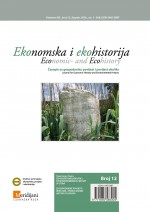Klimatski i agrarni aspekti bujanja razbojništva u Istri 1813.-1825.
The Climatic and Agricultural Aspects of the Proliferation of Banditry in Istria 1813-1825
Author(s): Marko JelenićSubject(s): Agriculture, Economic history, Criminology, Studies in violence and power, 19th Century
Published by: Društvo za hrvatsku ekonomsku povijest i ekohistoriju - Izdavačka kuća Meridijani
Keywords: banditry; violence; Istria; robbery; climatic conditions;
Summary/Abstract: The article based on the archival material kept in the National Archives in Pazin looks at the extent and the distribution of banditry and violence in Istria in the period between 1813 and 1825. The degradation of agriculture and the deterioration of the economy caused by fluctuations of climatic conditions, especially in the area of Rovinj and Pula favored the spread of banditry. The spread of the phenomena of banditry indicates that the population of Istria in the examined period, except with altered climatic conditions, degradation of agriculture and degradation of the economy have to deal with the growing problem of proliferation of banditry. These were difficult times that followed the Napoleonic wars and in Istria circled a large number of deserters, murderers and thugs, either individually or in groups. The istrian example points to the fact that due to the general poverty and misery theft resorted peasants, beggars and vagabonds, as men, women and minors. Due to the difficult economic situation the target of theft were often products on fields and small cattle. As in Istria was not established effective authority, robbers and bullies usually would not be caught and would continue to disturb the peaceful course of life on the peninsula.
Journal: Ekonomska i ekohistorija - Časopis za gospodarsku povijest i povijest okoliša
- Issue Year: 2016
- Issue No: 12
- Page Range: 5-14
- Page Count: 10
- Language: Croatian

